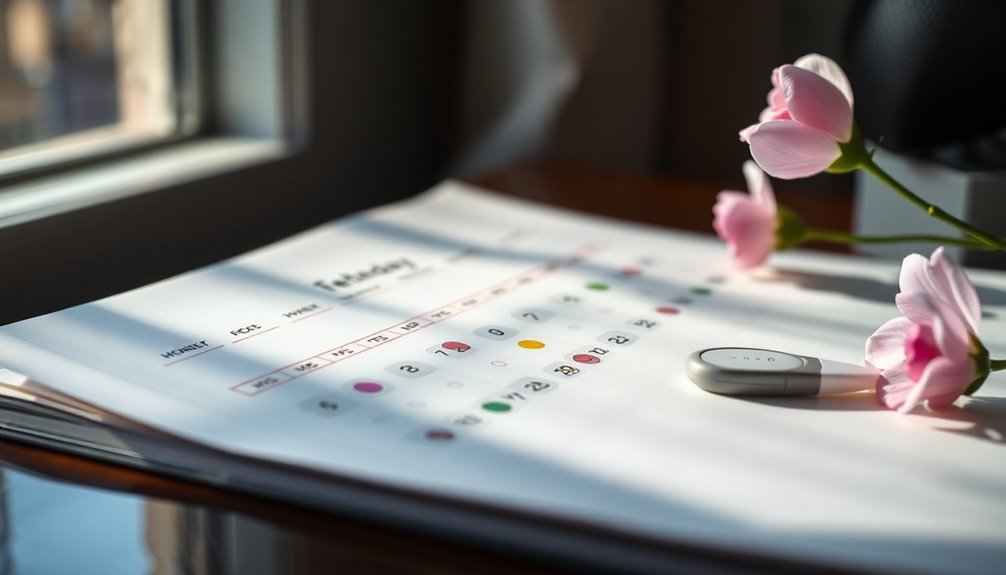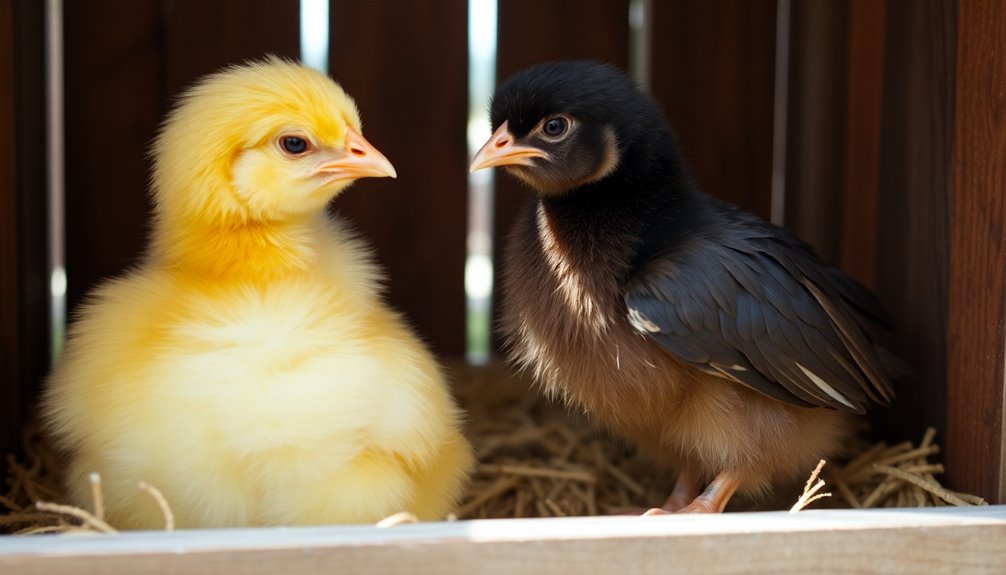The best time to have sex for pregnancy is during your fertile window, which lasts about six days: five days leading up to ovulation and the day of ovulation itself. You can identify this window by tracking your menstrual cycle and recognizing signs of ovulation, such as changes in cervical mucus or a slight increase in your basal body temperature. Aim to have intercourse every day or every other day during this period to boost your chances. Understanding these key factors can enhance your approach, and there's more to uncover that can support your journey to conception.
Key Takeaways
- The best time to have sex for pregnancy is during the fertile window, which includes five days before ovulation and the day of ovulation.
- Track your menstrual cycle to predict ovulation, occurring roughly 14 days before your next period.
- Use ovulation predictor kits (OPKs) to detect the LH surge, indicating imminent ovulation and peak fertility.
- Aim for intercourse every day or every other day during the fertile window to maximize conception chances.
- Monitor signs of ovulation, such as changes in cervical mucus and a rise in basal body temperature, for optimal timing.
Understanding Your Menstrual Cycle

Understanding your menstrual cycle is essential for optimizing your chances of conception. Your menstrual cycle typically lasts between 21 to 35 days, starting from the first day of your period.
Ovulation usually occurs about 14 days before your next period, marking the peak of your fertile window. The best chance of getting pregnant lies in recognizing the signs of ovulation.
Pay attention to changes in cervical mucus; it becomes clear and slippery, resembling egg whites, indicating that ovulation is near. This fertile window spans roughly six days, including the five days leading up to ovulation and the day itself.
Identifying the Fertile Window
Identifying your fertile window is essential for maximizing your chances of conception. This window spans approximately six days, including the five days before ovulation and the day of ovulation itself.
Ovulation typically occurs around 14 days before your next menstrual period, so tracking your cycle lengths helps predict your fertile days. Pay attention to changes in cervical mucus; when it becomes clear and slippery like egg whites, it signals that ovulation is near.
Since sperm can survive up to five days in your reproductive tract, intercourse leading up to ovulation can lead to pregnancy. Additionally, using an ovulation predictor kit can help you detect the surge in luteinizing hormone (LH) that indicates your fertile window.
Optimal Timing for Intercourse

To maximize your chances of conception, timing intercourse during your fertile window is essential. This period spans the five days leading up to ovulation and the day of ovulation itself. Engaging in intercourse during this ideal timing increases your chances considerably because sperm can survive in the female reproductive tract for up to five days.
Remember, the egg is only viable for fertilization for 12 to 24 hours after ovulation. To enhance reproductive health, try having sex every day or every other day during this window.
Monitoring changes in cervical mucus and using ovulation predictor kits can help you pinpoint the best days for intercourse, ensuring you're maximizing your chances for successful conception.
Signs of Ovulation

As you navigate your fertility journey, being aware of the signs of ovulation can greatly enhance your chances of conception. One key indicator is changes in cervical mucus; during your fertile time, it becomes clear, slippery, and resembles egg whites.
Tracking your basal body temperature (BBT) is also helpful; you'll notice a rise of about 0.4°F (0.2°C) after ovulation.
Ovulation predictor kits (OPKs) can detect surges in luteinizing hormone (LH), indicating ovulation is likely within 12-36 hours.
Additionally, you might experience physical signs of ovulation such as light spotting, cramping, or bloating.
Frequency of Intercourse

To boost your chances of conception, timing your intercourse around your fertile window is essential.
Aim to have sex every day or every other day during this period, but remember to keep it enjoyable and stress-free.
The right balance can enhance intimacy and create a more relaxed environment for conception.
Optimal Intercourse Timing
Understanding the ideal timing for intercourse greatly enhances your chances of conception.
The fertile window, which lasts about six days, includes the five days leading up to ovulation and the day of ovulation itself. To maximize your chances of pregnancy, aim for intercourse every day or every other day during this period.
Sperm can survive in the female reproductive tract for up to five days, ensuring they're present when the egg is released. The highest probability of conception occurs on the day of ovulation or within three days prior.
Tracking ovulation through cervical mucus changes or ovulation predictor kits can help you identify the best timing for intercourse, increasing your chances of achieving a successful pregnancy.
Stress-Free Intimacy
Finding the right balance between frequency of intercourse and stress-free intimacy can greatly enhance your chances of conception. Aim to have sex every day or every other day during your fertile window—about six days each cycle. This timing includes ovulation day and the five days prior, maximizing your chance of getting pregnant.
– Sperm can survive up to five days, while the egg is only viable for 12-24 hours post-ovulation.
Prioritize enjoyment and intimacy rather than feeling pressured to have sex daily.
Creating a relaxed atmosphere during intimacy can help reduce stress, which is essential for maintaining fertility.
Lifestyle Factors Affecting Fertility

Lifestyle choices play an important role in your fertility, as factors like weight, smoking, and diet can directly impact reproductive health.
Maintaining a healthy weight is vital; both overweight and underweight conditions can disrupt regular ovulation and reduce fertility.
Smoking greatly impairs reproductive health, leading to lower fertility rates in both men and women.
Limiting alcohol consumption is also important, as heavy drinking may negatively affect hormonal balance.
Engaging in moderate exercise benefits your body, but excessive training can lead to irregular ovulation, especially in underweight individuals.
A well-balanced diet rich in nutrients, particularly folic acid, enhances reproductive health.
For healthy couples trying to conceive, these lifestyle adjustments are essential for improving fertility and supporting a successful pregnancy.
Seeking Medical Advice

If you're struggling to conceive, it's important to consult your Ob-Gyn, especially if you're over 35 and have been trying for six months.
Recognizing any fertility challenges early can make a significant difference in your journey.
Don't hesitate to seek help; early intervention can greatly enhance your chances of successful conception.
When to Consult Ob-Gyn
Knowing when to consult your ob-gyn is essential for anyone trying to conceive. The American College of Obstetricians advises that healthy couples should seek medical advice after one year of trying to conceive if under 35 years old, and after six months for those aged 35 and older.
If you have irregular periods or known fertility issues like polycystic ovary syndrome (PCOS), it's wise to consult an ob-gyn sooner.
- If you're over 40, consider seeing a specialist early.
- After six months of trying without success, don't hesitate to seek help.
- Fertility specialists can offer tailored assessments to boost your chances.
Always monitor your progress and prioritize your reproductive health!
Recognizing Fertility Challenges
After understanding when to consult your ob-gyn, it's important to recognize potential fertility challenges that may arise during your journey to conception.
Healthy couples usually conceive within a year, but if you've been trying for longer, especially if you're 35 or older, it's time to seek medical advice. Both genders can face challenges, so consider a fertility evaluation.
Knowing when ovulation happens is essential; tracking your cycle helps you predict your ovulation. On fertile days, cervical mucus tends to be more abundant, indicating the best chance of getting pregnant.
If you're struggling, consulting a reproductive endocrinologist can address underlying issues. Regular check-ups can also guide your efforts to become pregnant and optimize your chances of success.
Early Intervention Importance
Seeking medical advice early in your journey to conceive can make a significant difference in your chances of success. If you're over 35, don't wait longer than six months of trying without results.
Both partners should get evaluated, as fertility challenges can affect anyone. Early intervention through reproductive medicine can uncover underlying issues, like hormonal imbalances, impacting your health and ability to become pregnant.
- Optimize your fertility with proactive health measures.
- Understand your ovulation cycle through fertility awareness.
- Address potential reproductive concerns with expert guidance.
Timely medical advice not only enhances your chances of conception but also supports overall women's health, ensuring a healthier pregnancy when the time comes.
Frequently Asked Questions
What Is the Best Sex Schedule for Pregnancy?
To create the best sex schedule for pregnancy, aim to have intercourse every 1-2 days, especially during your fertile window.
Pay attention to your body's signals, like changes in cervical mucus, to identify those vital days. If you're tracking ovulation, time your intimate moments around your peak fertile days.
This approach maximizes your chances of conception, ensuring sperm is present when the egg is released.
Stay relaxed and enjoy the process!
Is Morning Sex or Night Sex Better to Get Pregnant?
Imagine planting a seed in a garden—timing's essential, but the soil matters more.
When it comes to morning sex versus night sex, it's not a game-changer. Sperm quality might peak in the morning due to higher testosterone, but as long as you're within the fertile window, you're fine.
Focus on intimacy and regularity instead. Enjoy the process, and let the pressure melt away; that's what helps create the right environment for conception.
How Often Should We Have Sex to Get Pregnant?
To boost your chances of getting pregnant, aim to have sex every 1-2 days, especially during your fertile window, which includes the days leading up to ovulation.
Regular unprotected intercourse (every 2-3 days) can also help.
Remember, sperm can survive in your body for up to five days, so timing isn't everything.
Most importantly, keep the experience enjoyable and relaxed to minimize stress, which can impact your conception efforts.
How Many Days After Your Period Can You Get Pregnant?
Isn't it funny how you can be blissfully unaware of your cycle, yet still wonder about pregnancy?
The truth is, you can get pregnant as soon as a few days after your period ends. Since sperm can live up to five days, if you have intercourse during that time, you might conceive if ovulation occurs soon after.
Conclusion
In summary, timing is essential when trying to conceive. You're most fertile during the five days leading up to ovulation, with the highest chances of conception occurring on the day of ovulation itself. Notably, studies show that couples who have sex every other day during their fertile window increase their chances of pregnancy by up to 50%. By understanding your cycle and recognizing your body's signals, you can greatly enhance your journey toward parenthood.










